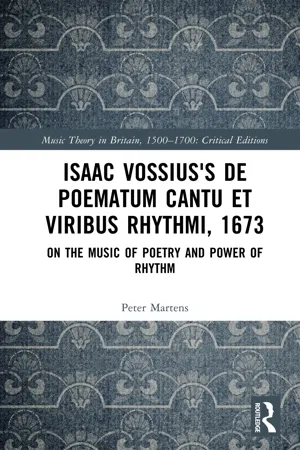
Isaac Vossius's De poematum cantu et viribus rhythmi, 1673
On the Music of Poetry and Power of Rhythm
- 194 pages
- English
- ePUB (mobile friendly)
- Available on iOS & Android
Isaac Vossius's De poematum cantu et viribus rhythmi, 1673
On the Music of Poetry and Power of Rhythm
About This Book
Dr Peter Martens provides the first complete edited English translation of, and commentary on, Issac Vossius's De poematum cantu et viribus rythmi, a late seventeenth-century work of Continental musical humanism, all the more interesting for being published in England and dedicated to royalist Henry Bennett, Duke of Arlington. This treatise plays an important but poorly understood role in the continued development of rhythmopoeia; Vossius continues the arguments of figures such as Vincenzo Galilei and Marin Mersenne - desiring to link linguistic rhythm, music, and the passions - by proposing a practical, if undemonstrated, method for doing so based on ancient poetic feet. This resuscitation of poetic feet in the service of affect is made explicit by Vossius, but is undoubtedly more familiar to musicologists from Wolfgang Caspar Printz's 1696 Phrynis Mitilenaeus or Johann Mattheson's 1739 Der vollkommene Capellmeister. Vossius, or more correctly, De poematum cantu, was often cited during the century after its publication, and no modern treatment of rhythmopoeia seems complete without a citation or short excerpt from this work. There is little secondary literature that focuses on this treatise, but what does exist links this work directly to John Dryden's composition of his 1687 and 1697 St. Cecilia odes, and their musical settings by Giovanni Battista Draghi and Jeremiah Clarke, respectively. In Dean Mace and H. Neville Davies' debate over the extent of Vossius's influence on these works can be found a rich picture of the contentious issues surrounding text-setting and musical affect that so occupied a great many writers in late-seventeenth-century England. A full translation and accompanying discussion of Vossius's own sources and musical influences allows English-language students and scholars to access and study this work in the depth and to the degree it deserves.
Frequently asked questions
Information
Table of contents
- Cover
- Half Title
- Title
- Copyright
- Dedication
- Contents
- Series editor’s preface
- Acknowledgments
- 1 Introductory essay
- 2 English translation: On the Singing of Poetry and the Powers of Rhythm
- 3 Original Latin text: De Poematum Cantu et Viribus Rythmi
- Index